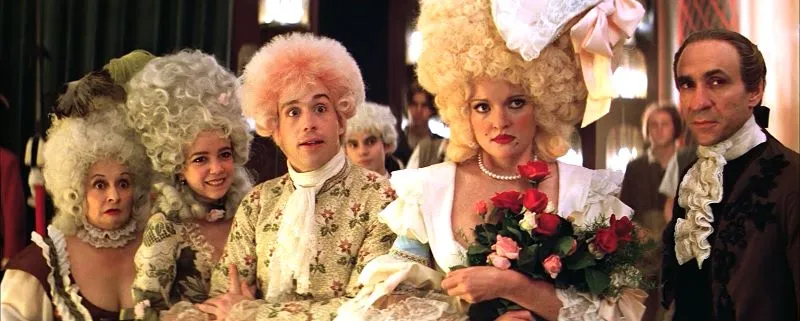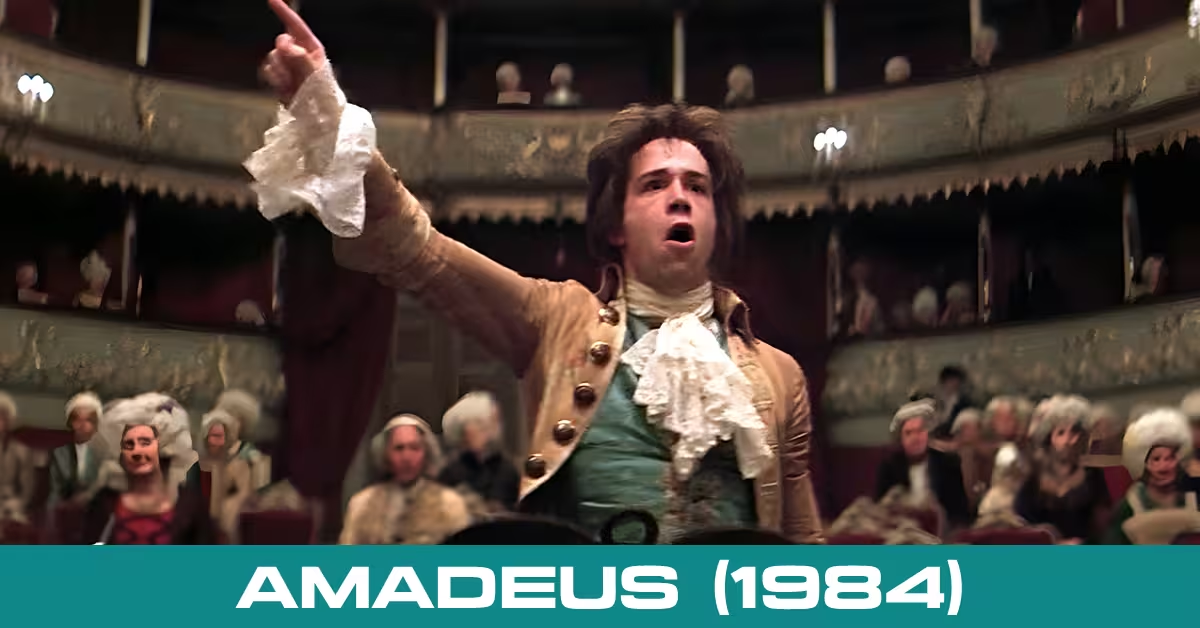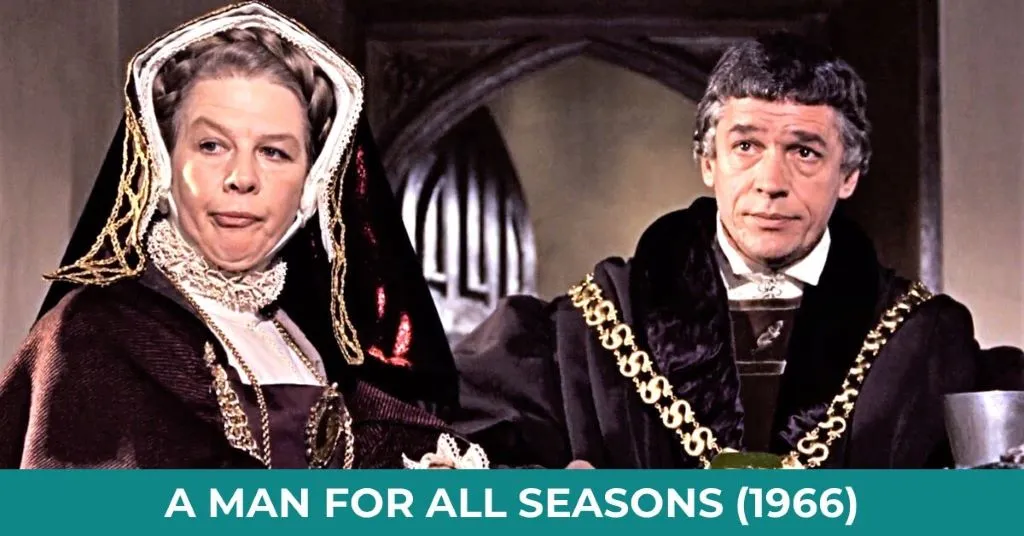Last updated on May 10th, 2025 at 10:24 am
Amadeus (1984) is not merely a historical film but a deeply evocative narrative that transcends the biographical accuracy of the life of Austrian composer Wolfgang Amadeus Mozart to explore profound human emotions, the dynamics of genius and mediocrity, and the conflict between personal ambition and divine talent.
Directed by Miloš Forman and adapted from Peter Shaffer’s stage play, the film has rightfully earned its place in cinematic history. It is one of the 101 best films I have been reviewing.
Table of Contents
Plot Overview
Amadeus is a fictionalized account of the life of the influential Austrian music composer Wolfgang Amadeus Mozart, as narrated by his contemporary, Antonio Salieri.
The film is set in Vienna in the 18th century and revolves around Salieri’s deep jealousy of Mozart’s natural genius. While Salieri is the court composer to Emperor Joseph II, he feels overshadowed by the younger, more talented Mozart, whose music seems divinely inspired.
The film starts with Salieri trying to commit suicide in the palace by confessing to murder Wolfgang Mozart. The film eventually evolves Salieri retelling the Mozart’s life to a young Father/priest, as the greatest music composer and a womaniser who failed to get any pupils because of his weakness towards women.
Broke and spendthrift Mozart married his landlady’s daughter after being turned down by the opera singer.
Despite outwardly befriending Mozart, Salieri secretly plots to destroy him, believing that God has chosen Mozart to mock his own mediocrity. Salieri manipulates events to undermine Mozart’s career and commissions a Requiem Mass that he plans to play and claims as written by him after Mozart’s death.
Salieri coming in disguise offers him a hefty price for it who was already struggling with financial troubles. However, burdened with work his health eventually gave up during a live opera collapsing from overwork. Salieri brings him home and compels him to finish the Requiem Mass.
Nevertheless, Mozart dies before completing the Requiem, and his body is buried in a pauper’s grave. The film ends with Salieri, now an old man, confessing his guilt to a young priest and declaring himself the “patron saint of mediocrity.”
My personal experience with this film was one of deep engagement, provoked by its poignant themes and captivating performances. There are several elements and lessons that modern viewers can learn from this masterpiece, which I would like to explore through my reflections.

Truths About Genius and Mediocrity
While Amadeus is often criticized for its historical inaccuracies, I found that these creative liberties are what make the film so compelling. The fictional rivalry between Mozart and Salieri is not about facts but about larger truths—the dynamics of genius and how it is perceived and responded to by others, particularly those who are talented yet fall short of greatness.
F. Murray Abraham’s portrayal of Antonio Salieri is a study of jealousy, bitterness, and internal conflict. Watching Salieri battle his admiration and envy for Mozart’s divine talent, one cannot help but reflect on the nature of artistic genius and its cost.
The film taps into a universal fear of being mediocre, of devoting one’s life to a craft only to be overshadowed by a peer who seemingly excels without effort.
For modern audiences, especially those in highly competitive creative or intellectual fields, this speaks volumes. In today’s world, where social media and digital platforms constantly showcase the successes of others, it’s easy to feel like Salieri—adequate, but never transcendent.
The destructiveness of Jealousy and the Desire for Recognition
We know how strong the desire for recognition can be from the 2019 Academy Award-winning film Joker.
Salieri’s jealousy consumes him, leading him to sabotage Mozart while maintaining a disguise of friendship. This disparaging force is central to the film’s emotional narrative.
The modern viewer can find resonance in Salieri’s feelings of inadequacy. In an age of comparison culture, where the success of others often magnifies one’s own perceived failures, Salieri’s plight is timeless. We might not go to the extreme lengths that Salieri does, but the film reminds us that envy and unfulfilled ambition can lead to personal ruin.
A key lesson here is that recognition and self-worth should not be dependent on external validation. The film invites reflection on how our obsession with success and fame, like Salieri’s, can be detrimental. Modern viewers could learn to focus on their own paths and find satisfaction in the creative process rather than in accolades.
The Unstoppable Nature of True Genius
Wolfgang Amadeus Mozart, as portrayed by Tom Hulce, is depicted as a brash, immature, and hedonistic character, yet his genius is undeniable. The film emphasizes how true genius is an unstoppable force that even personal flaws, societal rejection, and external obstacles cannot stifle. This portrayal challenges the romanticized notion of the tortured artist by showing that brilliance often emerges despite—and sometimes because of—flaws and struggles.
Mozart’s character serves as a reminder that greatness does not conform to societal expectations. For modern creatives, entrepreneurs, or even students, this is a powerful message. Genius and innovation often come from those who do not fit the mold, who challenge norms, and who may even appear reckless or irresponsible by conventional standards. The film encourages modern viewers to embrace their uniqueness and follow their passions, even in the face of criticism or doubt.
The Fragility of Human Life
One of the most heartbreaking aspects of Amadeus is the depiction of Mozart’s premature death and the fact that he dies in relative poverty, buried in an unmarked grave.
Despite his immense talent and contributions to music, Mozart’s legacy was not recognized in his lifetime to the extent it is today. This raises questions about how we value artists and innovators, both in their lifetimes and posthumously.
For those of us who aspire to leave a mark on the world, Mozart’s fate is a sobering reminder that legacy is often beyond our control.
For modern viewers, this speaks to the importance of valuing the present and the work we do, regardless of how it may be received or remembered. The film subtly critiques the societal tendency to glorify individuals after their deaths while failing to support or recognize their contributions during their lifetimes.
Artistic Rivalry in the Modern Age
The rivalry between Mozart and Salieri is, in many ways, emblematic of artistic and professional rivalries that exist today. It is also equally true that human passion for creating music may be lost because of dominance of Artificial Intelligence (AI).
Whether in the arts, business, or academia, we are all familiar with the pressures to outshine others and the bitter emotions that can arise when someone else’s success overshadows our own. However, Amadeus provides a stark warning: Salieri’s obsession with Mozart’s success ultimately destroys him.
Rather than finding fulfillment in his own achievements, Salieri allows envy to consume him.
Ultimately, the film teaches us that genius cannot be stifled by external forces, that envy is destructive, and that true fulfillment comes from within.
Whether you are a creative individual, a professional striving for success, or simply a lover of great stories, Amadeus offers rich lessons that remain profoundly relevant today.
Key Characters
Wolfgang Amadeus Mozart (Tom Hulce): A musical prodigy with a childish and eccentric personality, Mozart composes some of the greatest music ever written but suffers from poverty and illness.
Antonio Salieri (F. Murray Abraham): The envious court composer who plots against Mozart, bitterly resenting God’s gift to Mozart and not to him. His jealousy leads him to ruin Mozart’s life while trying to protect his own legacy.
Constanze Mozart (Elizabeth Berridge): Mozart’s loyal but frustrated wife, who struggles to support him and cope with his reckless behavior.
Emperor Joseph II (Jeffrey Jones): The ruler of Austria, who enjoys music but lacks the ability to fully appreciate Mozart’s genius.
Pivotal Moments
Mozart’s Introduction: Salieri’s first encounter with Mozart reveals a childlike, crude man whose extraordinary talent leaves Salieri in awe and jealousy.
The Requiem Mass: Salieri commissions Mozart to write a Requiem under the pretense of an anonymous benefactor, intending to steal it and present it as his own.
Mozart’s Decline: Overwhelmed by financial burdens and overwork, Mozart’s health deteriorates as he struggles to complete the Requiem and The Magic Flute.
Mozart’s Death: Mozart dies before finishing the Requiem, and his body is buried in a mass grave, marking a tragic end to his life.
Salieri’s Confession: An aged Salieri, now in a mental asylum, confesses to his role in Mozart’s downfall and expresses his enduring torment over being mediocre.
Awards and Recognition
Won 8 Academy Awards, including Best Picture and Best Director (Miloš Forman).
F. Murray Abraham won Best Actor for his portrayal of Salieri.
The film is acclaimed for its performances, screenplay, and the use of Mozart’s music throughout the soundtrack.
Amadeus 1984 quotes
Salieri: “All I ever wanted was to sing to God. He gave me that longing… and then made me mute. Why? Tell me that. If He didn’t want me to praise Him with music, why implant the desire, like a lust in my body, and then deny me the talent?”
Mozart: The only thing that matters is the music.
Salieri: “Time will speak, Father. I speak for all mediocrities in the world. I am their champion. I am their patron saint.”
Emperor Joseph II: “There are simply too many notes.”
Salieri: “Looks and talent do not always go together, Katerina”. “Looks do not interest men, Maestro. Only talent interests a woman of taste”, to Salieri by Katerina.
Mozart to Salieri: “A fire which never dies, burns you forever”.
Amadeus After 40 Years
Forty years on, Amadeus remains a film of lasting impact due to its exploration of themes like genius, mediocrity, and human jealousy.
Many modern critics highlight how the film delves into the emotional torment of Antonio Salieri, whose envy of Mozart’s effortless brilliance still resonates today, particularly in an era where public achievements are frequently compared.
Its visual grandeur, haunting use of Mozart’s music, and timeless exploration of ambition make it a cinematic classic that continues to captivate new audiences.
What sets Amadeus apart, especially after four decades, is its ability to provoke deep reflection on artistic rivalry and the subjective nature of success. As one review noted, Salieri’s envy and manipulation of Mozart reflect contemporary feelings of inadequacy amidst others’ success—a universal human emotion.
The film’s portrayal of a “mediocre” artist grappling with divine talent resonates with anyone who has ever felt overshadowed by a peer, making it continually relevant.
Critics also praise the film’s meticulous craftsmanship, especially its breathtaking cinematography and use of light to enhance the period atmosphere. The film’s settings—stately operatic performances lit by candlelight—are as much a character in the story as Mozart and Salieri themselves.
In today’s digital age, the lush, organic aesthetic of Amadeus is often celebrated for its authenticity and immersive qualities, setting a high standard for historical drama.
Scholarly Opinions on Amadeus (1984)
The 1984 film Amadeus, directed by Milos Forman and based on Peter Shaffer’s play, stands as a landmark in the intersection of cinema, musicology, and cultural myth-making.
The film portrays the life of Wolfgang Amadeus Mozart through the lens of Antonio Salieri’s envy-driven narrative, blending historical fact with creative fiction to explore themes of genius, mediocrity, and divinity.
Myth vs. Historical Accuracy
While Amadeus is not a historically accurate depiction of Mozart’s life, it crystallizes the Romantic myth of Mozart as a childlike, divinely inspired genius. Critics like Robert L. Marshall in his article titled Film as Musicology: Amadeus argue that the film’s purpose is not strict historical fidelity but the exploration of deeper truths about the nature of genius and human frailty.
The narrative dramatizes Salieri’s internal struggle with his admiration for Mozart’s musical brilliance and his bitterness at his own mediocrity, creating a compelling emotional core.
Religious and Philosophical Dimensions
Daniel R. Jones in his scholarly article titled Peter Shaffer’s Continued Quest for God in Amadeus emphasizes that the film continues Shaffer’s exploration of humanity’s relationship with the divine.
Salieri views Mozart as a vessel of divine inspiration, which intensifies his existential crisis. This portrayal, akin to Shaffer’s earlier works like The Royal Hunt of the Sun and Equus, explores humanity’s paradoxical encounter with divinity, mediocrity, and spiritual transcendence.
Artistic and Narrative Achievements
Marshall and Keefe in their articles Film as Musicology: Amadeus and Beyond Fact and Fiction, Scholarly and Popular: Peter Shaffer and Milos Forman’s Amadeus at 25 highlight how the film uses Mozart’s music as the true protagonist.
The compositions are seamlessly woven into the narrative, offering audiences a visceral connection to Mozart’s genius. Salieri’s role as an unreliable narrator adds a subjective lens, shaping the story as much around his envy as around Mozart’s life.
This structure reinforces the film’s thematic focus on genius, legacy, and the limits of human ambition.
Cultural and Critical Impact
Simon P. Keefe notes that the film has profoundly shaped public perceptions of Mozart, romanticizing his genius and tragic life while sparking renewed interest in classical music.
The film’s accessibility and imaginative storytelling balance scholarly insights with popular appeal. Despite criticisms of historical liberties, Amadeus has inspired widespread appreciation for Mozart’s music and life.
Satirical Reinterpretation
In his article From Barthes to Bart: The Simpsons vs. Amadeus, Justin D. Burton examines how The Simpsons parodies the film in its episode “Margical History Tour,” deconstructing the cultural myth of Mozart as a rock-star genius.
By exaggerating and satirizing the narrative, The Simpsons critiques the oversimplifications in Amadeus, encouraging a more nuanced engagement with Mozart’s historical and cultural legacy.
Conclusion
Amadeus bridges the gap between scholarly and popular representations of Mozart, using fictionalized storytelling to delve into universal themes of genius, envy, and existential struggle.
While its historical accuracy has been questioned, its cultural and artistic significance remains undeniable, fostering a broader appreciation for Mozart’s legacy and classical music. Through its narrative depth and emotional resonance, the film continues to captivate audiences, inspiring both critique and celebration.
Amadeus continues to resonate with audiences not only for its cinematic brilliance but for the universal truths it explores. The film’s fictionalization of historical events allows it to explore these themes in ways that pure biography could not, making it both timeless and relevant to modern viewers.






